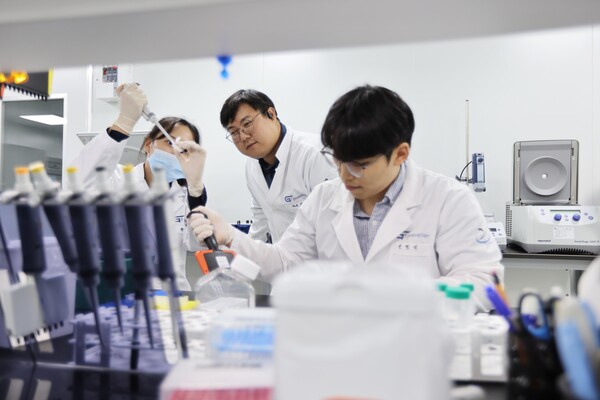Several Korean pharmaceutical companies, including GI Innovation, Liveome, GC Cell, and PharmGen Science, have been selected for funding under the 2024 national new drug development program, managed by the Korea Drug Development Fund (KDDF).
The initiative supports the full cycle of drug development to enhance the global competitiveness of Korea’s pharmaceutical and biotech sectors. The selected projects include advancements in cancer therapies, microbial gene treatments for graft-versus-host disease, liver cancer diagnostics, and next-generation immune cell therapies.

GI Innovation said Tuesday that it received funding for two projects. The first involves advancing GI-102, a cancer therapy in phase 2 clinical trials, in partnership with Professor Kim Seung-tae of Samsung Medical Center's hematology and oncology department. The goal is to expedite regulatory approval and technology transfer, with combination trials of GI-102 in both subcutaneous (SC) and intravenous (IV) formulations alongside Keytruda (pembrolizumab).
The second project is for GI-128, a next-generation bispecific antibody for cancer treatment, which will progress to the preclinical stage.
“Inspired by the success of Yuhan Corp.’s Leclaza (lazertinib), which benefited from KDDF’s clinical support, we aim to create the next Leclaza and achieve early commercialization,” said Jang Myoung-ho, chief scientific officer (CSO) at GI Innovation.
Liveome, a Medytox affiliate, said its graft-versus-host disease (GVHD) treatment project for LIV031 has been selected.
LIV031 is a microbial gene therapy targeting GVHD, a rare disease that can occur after organ or hematopoietic stem cell transplants. It causes significant organ damage and has a high mortality rate, with no effective standard treatment. Liveome aims to develop a novel therapy targeting intestinal immune function to overcome the limitations of existing treatments. The project will receive two years of funding to support lead compound identification.
GC Cell’s B-cell lymphoma treatment candidate, GCC2004 (CD19 CAR-NK), was also selected for funding. This CD19-targeted chimeric antigen receptor-natural killer (CAR-NK) cell therapy is designed to treat relapsed B-cell blood cancers.
The therapy uses a patented CAR signaling domain to enhance NK cell activity and co-expresses IL-15 to improve in vivo persistence and anti-tumor efficacy. Preclinical studies show it offers superior stability and safety compared to other cell therapies.
“Being selected for this national project is a critical turning point for demonstrating GCC2004’s competitiveness as a next-generation immune cell therapy,” said a GC Cell official. “With no NK cell therapies currently approved, we plan to accelerate development with government support.” The company also plans to expand the therapy’s indications to include autoimmune diseases.
PharmGen Science’s liver-specific MRI contrast agent, RD1303, was also selected for support in its preclinical development. RD1303, a gadolinium-based agent, targets liver tissue transporters, improving liver cancer diagnosis with MRI by enhancing the contrast between healthy tissue and cancerous lesions. The company aims to advance RD1303 as a safer diagnostic tool for liver cancer.
Related articles
- GC Cell unveils global expansion plan with $11.4 mil. licensing deal in Indonesia as 1st step
- Medytox Q3 operating profit up 68%, driven by hyaluronic acid filler sales
- [SITC 2024] GI Innovation’s therapies aim to enhance CAR-T durability and overcome tumor immune suppression
- Access Bio's legal victory overturned, case against Gredale reopened in Covid diagnostics kit dispute
- GC Cell begins tech transfer of Immuncell-LC to Indonesia’s Kalbe Farma
- Biotech leaders honored at 2024 Korea Biotechnology Industry Day
- KDDF aims to boost clinical trial budget by 30% in 2025, awards 6 outstanding projects
- GI Innovation to focus on licensing deals at 2025 J.P. Morgan Healthcare Conference
- Korea's pharmaceutical R&D ecosystem faces challenges as government R&D budget fluctuates
- GI Innovation, GI Biome advance to the semi-finals of the XPRIZE Healthspan with anti-aging combination therapy

